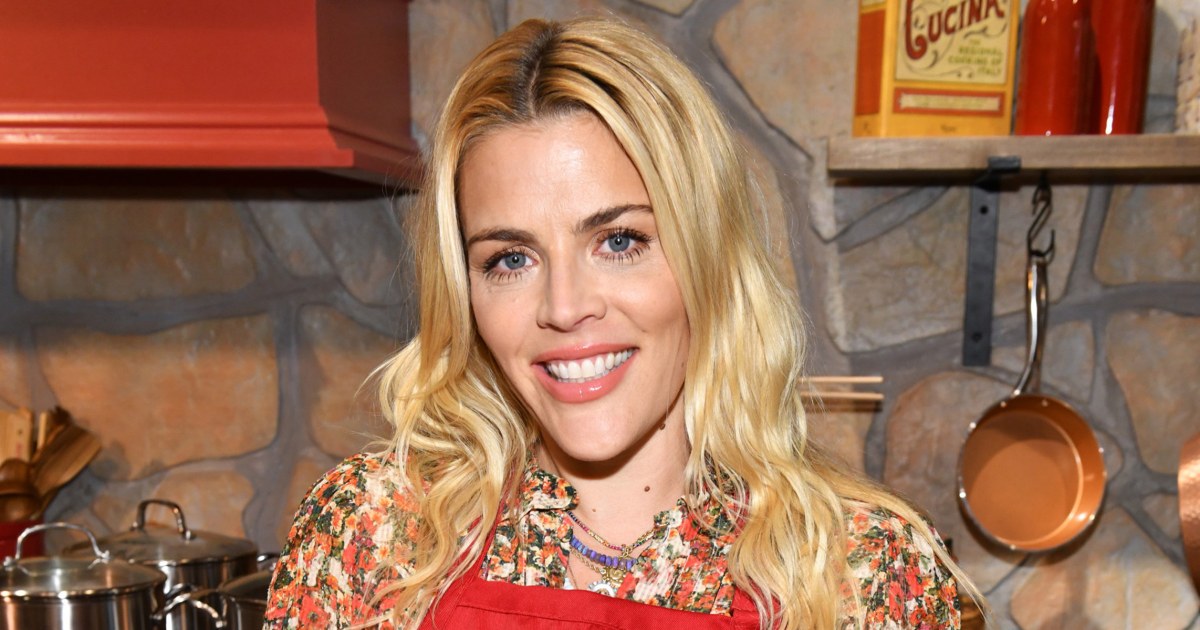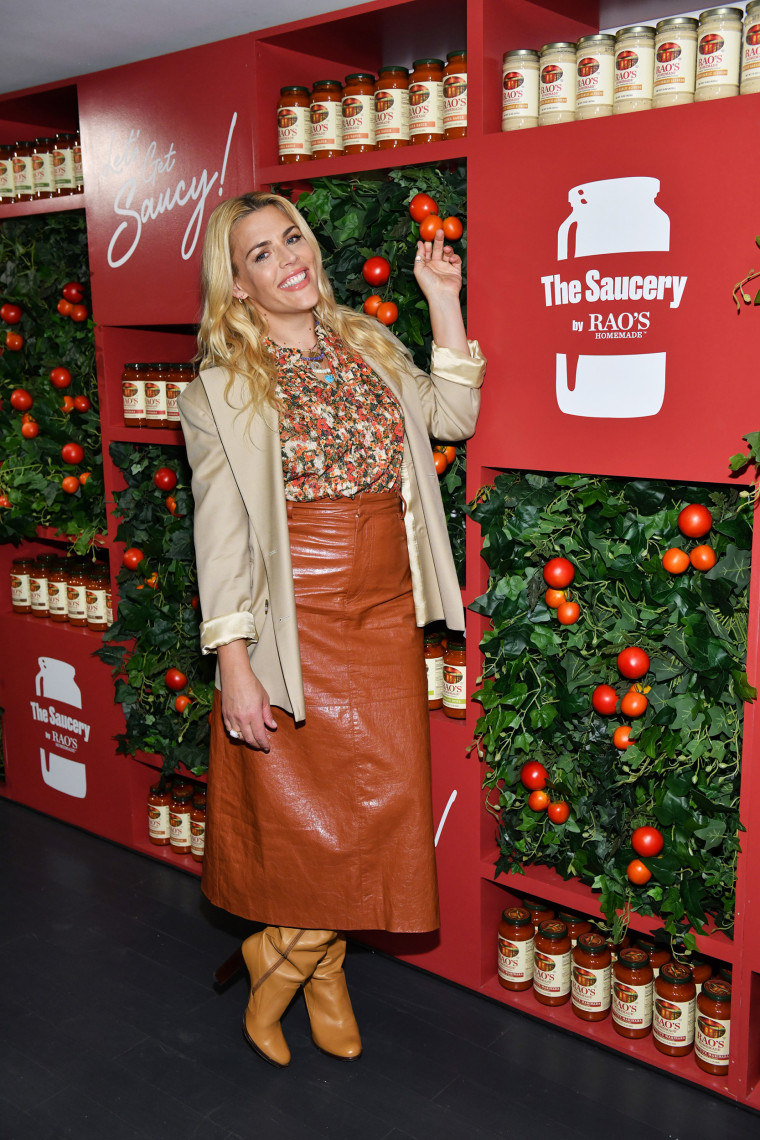
Busy Philipps on Balancing Acting and Activism
Busy Philipps is a former teen star who’s navigated a successful Hollywood career in the nearly 25 years since she got her start. She’s also hosted her own talk show and podcast and written a New York Times bestselling memoir. And these days in particular, as she devotes more of her time to abortion access and transgender rights activism, Philipps is not so easy to put in a box.
On a recent spring evening, I met her at a pop-up event for Rao’s Homemade in New York City. Philipps (dressed to kill, naturally, by her long-time stylist Karla Welch) was at “The Saucery” to help spread the word about Rao’s new charity partnership with Jersey Cares, a local nonprofit. Beds of herbs helped set the scene alongside suspiciously perfect tomato vines snaking towards the ceiling, from which dried sausages dangled. I plucked an air-fried piece of bowtie pasta off the top of my “Busy’s Bloody Mary,” where it had been perched at a jaunty angle. “What ‘Saucery’ is this,” I joked, regretting it immediately. The non-crunchy parts of the Bloody helped me regain my composure. Reasoning that noodles and booze are always conducive to good conversations, I asked Philipps about how her activism has informed her sense of self.
“Early on I thought that in order to find success I needed to be a certain thing and basically only one of those things,” Philipps said, “sort of at the expense of other parts of myself. But also that was the message I was being given by the industry. Things have shifted, and I think that having different facets of talents and things that interest you, especially as a woman, is now beneficial to you in your career. It’s good to be able to have different ways of expression and monetizing your creativity.” She mentioned her podcast as an example of an unexpected significant revenue stream in recent years, despite confessing that she herself is not much of a podcast listener.
Philipps had recently traveled to Austin for South by Southwest to promote the upcoming season of her hit Peacock show “Girls5eva,” but also used her time there to visit one of the last abortion clinics in Texas, a cause she is passionate about. “I find myself increasingly having a kind of whiplash,” Philipps said about the cognitive dissonance of all she’d packed into the trip. Florida’s controversial “Parental Rights in Education” bill, which was dubbed the “Don’t Say Gay” bill by its opponents, had just been signed into law, and more than a dozen states were already proposing similar legislation. In Austin, she’d also attended “a panel the ACLU was having for trans families… and specifically trans kids and their parents, to offer them support and legal counsel. So, the whiplash between talking about our girl group and the fun that we have on set and then being faced with these things that have consequences on real people and their lives in our own country … is a lot to hold, for everyone. And I know lots of people would rather not. *I* would rather not! Are you kidding?!” she asked, shaking her head. But as a celebrity with a large platform, Philipps takes what she sees as her social responsibility very seriously. “Part of what I really believe is that we can course-correct through our entertainment and through our shows. And I think that the onus is on people in the entertainment community to make better content, putting positive, progressive messages into our culture. Because the job of art through history is to help the culture move forward. And we’ve seen a slow and steady backslide. We have to figure out how to correct it, and I can tell you it’s not going to be from fighting.”

Being outspoken is baked into her personal brand, so to Philipps, even her most controversial opinions are of a piece with everything she stands for. To her fans, of course, this is a large part of the attraction; as she put it, “a lot of people consider me a personality just for being myself.” But not every Hollywood star is willing to fight for their values in such a public way— and Philipps knows firsthand that advocacy can come at cost. She spoke slowly and carefully about the first time a death threat was sent to her family home, which she shares with her husband Marc Silverstein and two children, one of whom has come out as nonbinary and uses they/them pronouns. As a “straight, cis, white woman,” she said, “I’m obviously born with inherent privilege. But a lot of people in the entertainment industry are concerned about things that I believe, ultimately, don’t matter. This (fame) could all go away tomorrow … and to be fair, some of the things that I’ve been very outspoken about, abortion and trans rights, can feel scary to people to speak up about because the side that is anti is actually scary. And actually perpetrates violence on the communities that speak up, the people that choose to be public, and that’s not lost on me.”
Philipps said that she had been quietly doing activist work long before she made the choice to be more “vocal” about it, a decision she consulted about with her husband. “He was a hundred percent supportive of everything that I wanted to be able to do with my platform. But I’ve had things that have been scary happen and we’ve had threats made. I actually will never forget (the first death threat). It was specifically about — it’s so crazy — abortion stuff and also just like equality, I guess? But it really knocks the wind out of you. I felt like I wanted to take my family and crawl into a cave and never come out.”
The instinct to hide, however, was only temporary. “Ultimately you realize that if I sit here in this place of privilege and I can’t handle it, how do I expect anyone else to? And if I’m not willing to do it how would anyone, ever, be willing to do it?! So you have to just kind of keep going and you learn how to take other precautions. I know better now how to deal with it, but sometimes it still knocks the wind out of me. Being put into one of those news machines and being spun up in a right-wing propaganda machine, it’s terrifying when that happens for the first time. And there’s almost no recourse for it. And it can feel like it’s not worth it to say anything ever again. So I do understand the inclination from some people in the public eye that feel like they have enough that they’re dealing with. And I get it. But for me at this point, there’s too much at stake and there’s too much that we’ve already lost by being bullied by a bunch of babies.”
Given her rather full plate both professionally and personally, Philipps has adopted an easygoing philosophy when it comes to feeding her family. Her preference for unfussy comfort food is one that working parents everywhere will relate to. “I don’t like to feel outsmarted by a recipe,” she said. “I don’t want to feel disappointment in myself. I have friends who are very much going through cookbooks and pulling complicated recipes and trying new things. That’s not for me. I like things that just taste good and are fairly fun and easy to make.” At a time when many people view cooking as a competitive sport where gold medals come in the form of Instagram likes, and perfectly plated dishes cry out for comments alongside depressing news items in our social media feeds, perhaps this is her most mundane form of rebellion. We gazed around The Saucery, where jars of Rao’s Homemade sauce towered above us, while an $800 bedazzled version glistened in a showcase. Given how Instagram-worthy it all was, engineered, of course, to invite that exact impulse, it seemed to exemplify the cognitive dissonance we’d been talking about quite aptly.
The scents of truffles, Calabrian chilis and basil mixed invitingly in the air. Leaning over a counter full of tiny portions of pasta, Philipps ruminated on the strangeness of being a person in the world in 2022, celebrity or not. With everything she’s doing, her biggest priority is “making it through each day and making sure that my children and all the people that I love make it through every day mostly unscathed.” It’s a concern that’s particularly top of mind for parents of queer children. According to the Trevor Project’s 2021 National Survey on LGBTQ Youth Mental Health, 42% of LGBTQ youth had seriously considered attempting suicide in the past year, including more than half of transgender and nonbinary youth. Transgender kids are also more likely to report “violence victimization and substance use” compared to their cisgender peers. “We’re really all dealing with a lot and every day brings a new challenge, so that’s the thing that occupies a lot of my brain space on a daily basis,” Philipps said. As for speaking up on the issues that matter? “It’s the only choice as far as I’m concerned.”


